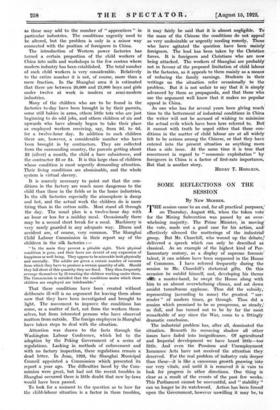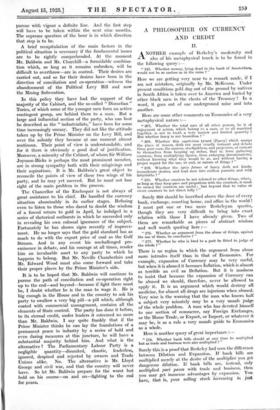SOME REFLECTIONS ON THE SESSION
By NEW MEMBER. THE session came-to an end, for all practical purposes,' on Thursday, August 6th, when the token votes for the Mining Subvention was passed by an over; whelming majority. The Prime Minister, in moving: the vote, made out a good case for his action, and! effectively silenced the mutterings of the industrial! group. But Mr. Churchill, who wound up the debate,! delivered a speech which can only be described as classical. As an example of the highest kind of Par- liamentary oratory, as a display of supreme forensic talent, it can seldom have been surpassed in the House' of Commons. I have referred frequently during the session to Mr. Churchill's rhetorical gifts. On this occasion he outdid himself, and, developing his theme Allth a master-hand, he swept the House along with him to an almost overwhelming climax, and sat down amidst tumultuous applause. Thus did the subsidy,' representing (according to some) the greatest " sur- render " of modern times, go through. Thus did a' session which promised to be so prosperous, so- steady,' so 'dull, and has turned out to be by far the most remarkable of any since the War, come to a fittingly • dramatic conclusion.
The industrial problem' has, after all, dominated the situation. Beneath its menacing shadow all other issues have faded into insignificance. Of agricultural and Imperial development we have heard little—too! little. And even - the Pensions and Unemployment Insurance Acts have not received the attention they deserved. For the real problem of industry cuts deeper than these—it is like a cancerous growth gnawing into_ our very vitals, and until- it is removed it is vain to look for progress in other directions. One thing is clear as a result of the events of the past few weeks.- This Parliament cannot be uneventful, and " stability can no longer be its watchword. Action has been forced' upon the GOvernment, however unwilling it may be, to pursue with vigour a definite line. And the first step will have to be taken within the next nine months. The supreme question of the hour is in which direction that step is to be.
A brief recapitulation of the main factors in the political situation is necessary if the fundamental issues are to be rightly comprehended. At the moment Mr. Baldwin and Mr. Churchill—a formidable combina- tion which, so long as it remains unbroken, will be difficult to overthrow—are in control. Their desires are carried out, and so far their desires have been in the direction of conciliation and co-operation—witness the abandonment of the Political Levy Bill and now the Mining Subvention.
In this policy they have had the support of the majority of the Cabinet, and the so-called " Dismelian " Tories, of which some of the younger men form an active contingent group, are behind them to a man. But a large and influential section of the party, who can best be described as the " industrialists," have been for some time increasingly uneasy. They did not like the attitude taken up by the Prime Minister on the Levy Bill, and over the subsidy they became at one moment almost mutinous. Their point of view is understandable, and for it there is obviously a good deal of justification. Moreover, a minority of the Cabinet, of whom Sir William Joynson-Hicks is perhaps the most prominent member, are in strong sympathy both with their misgivings and their aspirations. It is Mr. Baldwin's great object to reconcile the points of view of these two wings of his party, and he may yet succeed. But he must not lose sight of the main problem in the process.
The Chancellor of the Exchequer is not always of great assistance to his chief. He handled the currency situation abominably in its earlier stages. Refusing even to listen to those who dared to doubt the wisdom of a forced return to gold in April, he indulged in a series of rhetorical outbursts in which he succeeded only in revealing his own colossal ignorance of the subject. Fortunately he has shown signs recently of improve- ment. He no longer says that the gold standard has as much to do with the export price of coal as the Gulf Stream. And in any event his unchallenged pre- eminence in debate, and his courage at all times, render him an invaluable asset to any party to which he happens to belong. But Mr. Neville Chamberlain and Mr. Edward Wood must also come forward and take their proper places by the Prime Minister's side.
It is to be hoped. that Mr. Baldwin will continue to pursue the path of conciliation and co-operation right up to the end—and beyond—because if fight there must be, I doubt whether he is the man to wage it. He is big enough in the House and in the country to ask his party to swallow a very big pill—a pill which, although coated with commercial management, contains all the elements of State control. The party has done it before, to its eternal credit, under leaders it esteemed no more than Mr. Baldwin. I say quite frankly that if the Prime Minister thinks he can lay the foundations of a permanent peace in industry by a series of bold and even daring measures at this juncture, he will have a substantial majority. behind him. And what is the alternative ? The Parliamentary Labour Party is a negligible quantity—disunited, chaotic, leaderless, ignored, despised and rejected by owners and Trade Unions alike. No. The alternative is Mr. Lloyd George and civil war, and that the country will never have. So let Mr. Baldwin prepare for the worst but hold on his course—on and on—fighting to the end for peace,







































 Previous page
Previous page